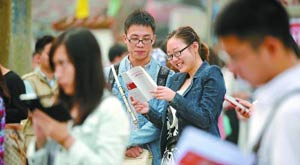Reasons behind the lure of civil service
China Daily by Tang Jun, October 24, 2014 Adjust font size:
Many expect the number of applications for the national civil service examination, or guokao, to drop slightly this year, even though the 10-day window to submit applications closes on Oct 24. However, it is still too early to say that youths are losing interest in guokao. As a matter of fact, there could be a surge in the number of applications on the last two days.
The popularity of guokao depends largely on a wide range of applicant-related factors.
In other words, the expected drop in the number of applications for guokao cannot be related to the anti-corruption drive in China. As a corollary, more applications for guokao do not necessarily indicate rising levels of corruption. On the contrary, more applicants for civil service jobs mean tougher employment situation in the country.
A record 7.2 million fresh college graduates are expected to enter the job market this year. The rapid rise in the number of graduates over the past few years has made guokao more attractive for job seekers, with 1.5 million taking the civil service exam in 2013.
Most guokao applicants are fresh college graduates, who are supposedly attracted by the "special offers" in the job market such as relatively easy access to employment. It is thus fair to say that many of the fresh graduates, in their eagerness to land a government job, do not consider how tough guokao would be before submitting their applications, but once they realize the extremely low success rate they just drop out of the race. The toughness of the competition can be gauged from the fact close to 1.5 million candidates are expected to compete for the roughly 20,200 posts this year.
In fact, between 20 percent and 35 percent of the candidates are said to have quit the race over the last five years, which shows that more applications do not necessarily mean more candidates taking guokao.
Given their lack of experience, most, if not all, fresh graduates seek stable and secure jobs. Now that private companies as well as some State-owned public enterprises have introduced the "contract system" in employment, an increasing number of graduates looking for permanent employment with good chances of promotions and increments tend to opt for the civil service. Perhaps this explains why women graduates, who face greater pressure and restrictions both at home and workplace, are more inclined to take guokao.
Therefore, the "guokao fever" should not be seen as an abnormal phenomenon directly related to the campaign against corruption. Moreover, a similar craze can be seen in both developed and developing countries, including the United States and India, where many graduates choose to be public servants given the economic slowdown and thus the uncertainty of the employment market. After all, government jobs are only a means for people to earn a living. In this sense, they are no different from other jobs.


